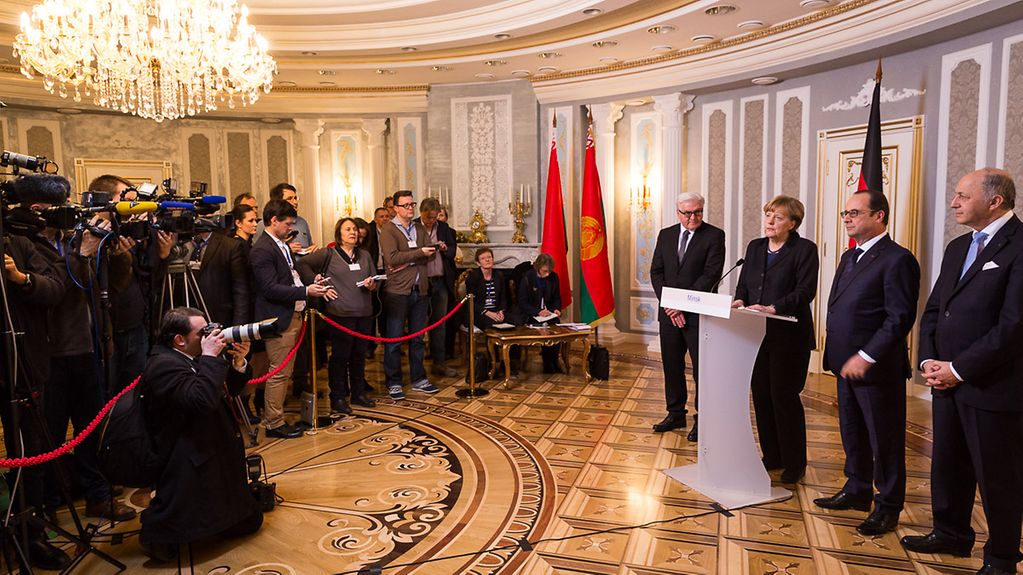Minsk summit meeting on Ukraine
After marathon negotiations Chancellor Angela Merkel and the Presidents of France, Russia and Ukraine have agreed on steps towards achieving a peaceful solution to the conflict in Ukraine. The statement issued after the summit meeting provides for a package of measures to implement the Minks agreements signed in September 2014 - "a ray of hope" as Angela Merkel put it.

Agreement reached - ceasefire to come into force on 15 February at 0:00 hours
Photo: Bundesregierung/Kugler
"I have no illusions. We have no illusions. An enormous amount of work is still needed," said Chancellor Angela Merkel after almost seventeen hours of negotiations. Nevertheless her joint initiative with President François Hollande was well worthwhile, because a ceasefire is to come into force at midnight on Saturday. Federal government spokesperson Steffen Seibert added via Twitter, "Then the withdrawal of heavy weaponry. This is the hope."
Summing up, the Chancellor said, "There is a genuine chance of improvement. Germany and France, France and Germany have together demonstrated that we have made a contribution, also in alignment with Europe." Angela Merkel expressly thanked President Hollande for his support.
In the Declaration of Minsk the four signatories Angela Merkel, François Hollande, Vladimir Putin and Petro Poroshenko reaffirmed their full respect for the sovereignty and territorial integrity of Ukraine. "They firmly believe that there is no alternative to an exclusively peaceful settlement." To achieve this they are fully committed "to undertake all possible individual and joint measures".
Arduous negotiations
The negotiations between Chancellor Angela Merkel, French President François Hollande, Russian President Vladimir Putin and Ukrainian President Petro Poroshenko in Minsk, the capital of Belarus, lasted about seventeen hours. At times with the support of their foreign ministers, the top-level meeting sought ways of ending the crisis in Ukraine. For Angela Merkel and François Hollande this was a continuation of the previous week’s Normandy format talks in Kyiv and Moscow.
"We would have liked to see more," said Federal Foreign Minister Frank-Walter Steinmeier after the negotiations. No comprehensive settlement was achieved, and no breakthrough. "However, after weeks of violence, Minsk II could mark a step away from this spiral of military escalation," said the minister.
A meeting with far-reaching consequences
"The fact that this meeting is taking place is a ray of hope – but no more than that," said government spokesperson Steffen Seibert on Wednesday prior to the meeting in Minsk. What the Chancellor has said several times in public still holds true, he added. "It is uncertain whether or not a result can be achieved. But in spite of all the uncertainty, this initiative is worthwhile in the interests of the suffering people in eastern Ukraine," said Steffen Seibert.
The focus of the Franco-German initiative over recent weeks has always been to "alleviate or end the worsening violence, the ongoing bloodshed in eastern Ukraine and the suffering of the people," declared the government spokesperson. The focus is on achieving a ceasefire. Over and above this, it is important to breathe life into the Minsk agreements signed in September 2014.